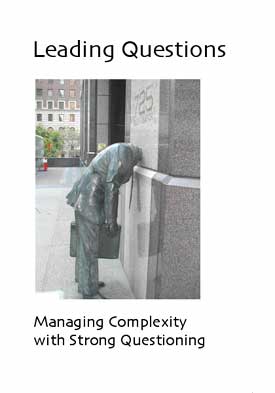Questioning Presumptions
A wise leader knows that we are all burdened with presumptions that may act as blinders to keep us from making smart decisions. She or he learns to question those presumptions and expose them to severe scrutiny.
We live in times when leaders may propose simple-minded solutions to complex problems and issues. Pandering to a public that sometimes welcomes the sugar-coated mind byte1, such leaders come up with simple phrases to fix schools, win a war or handle a natural disaster like the storm shown above. They are prisoners of their own presumptions and preconceptions. They are blinded by ideology, faith and wishful thinking. They wade into tough situations with the certainty of fools, ignoring all kinds of warning signs, cues and data that might suggest a change of course or a different strategy. Once committed to a course of action, they stick to their guns and stay the course as if stubborn, close-minded adherence to a plan were some kind of virtue.
"Damn the torpedoes! Full speed ahead."
"Damn the consequences! Stay the course."
1. Some indicators of mentalsoftness . . .
Reliance upon maxims - truisms, platitudes, banalities and hackneyed sayings to handle demanding, complex situations requiring deep thought and careful consideration.
Appetite for bromides - the quick fix, the easy answer, the sugar coated pill, the great escape, the short cut, the template, the cheat sheet.
Preference for platitudes - near truths, slogans, jingles, catch phrases and buzzwords.
For the rest of the list, check out the article, "Beyond Information Power" at fno.org/may2000/beyondinfo.html.
|
Pandering is Not Leading
Instead of elevating the tone and level of public debate, politicians from both the Left and the Right commonly offer mind candy rather than pills difficult to swallow, hoping for votes, applause, contributions and accolades rather than wrestling with difficult truths or the real challenges and solutions requiring sacrifice.
Sadly, this kind of leadership often leads to old people drowning in hospital beds, civic chaos, sectarian mayhem, global warming and waves of international instability. Teaming with denial, such simple-minded thinking when linked to an unquestioning spirit wreaks havoc. When leaders approach decisions with rigid ideologies, they place us all at risk. How can anyone believe it possible to fight a prolonged war without sacrifice?
Understanding the Context by Questioning the Context
Wishful thinking is the leader's biggest risk. Instead of figuring out what is actually happening, the leader may dream up scenarios and a context more agreeable than the real thing. Planning then proceeds within the fallacies of that dream context.
It is a bit like walking onto to a baseball diamond with a lacrosse stick. To play, it helps to figure out which game is being played and take action that fits the rules.
"But I don't like baseball!" the leader may whine.
"I can convince all these players to lay down their gloves and play lacrosse."
"They are either with me or against me!"
The savvy leader hires a team of advisers skilled at diagnosis, at sizing up situations and challenges with accuracy. They know how to ask probing questions and apparently irrelevant questions. Even though the leader may have hinted at some policy preferences this team has the courage to counter those hints and suggestions if they are poorly suited to the context.
The foolish leader prefers yes-men and yes-women - a team that is quick to agree with the leader's wishes and preconceptions. Operating on instinct, gut and a sense of destiny, the foolish leader commits the school, the hospital, the corporation or the nation to a course of action that ends in disaster.
When Playing Fields Become Killing Fields
Mistaking the context and playing by the wrong rules with the wrong tools and equipment can, in the extreme, lead to premature and unnecessary deaths.
We saw this in New Orleans.
We are seeing it in Iraq.
Wishful thinking and ideological thinking is a severe form of blindness.
Simple greed allowed decades of development in the Mississippi Delta to proceed with governmental blessing. That development increased the flood risk to communities along the river's path. Leaders of both political parties conspired to look the other way while reaping the profits that ultimately led to levies failing and innocent people drowning. Meanwhile, the impact of global warming resolutely denied by some leaders may have led to a worsening of tropical storms.
Blindness and an unquestioning approach to disaster planning led to inadequate plans, poorly funded levy programs, the downgrading of FEMA, slow response and what amounts to negligent homicide. Both political parties and leaders at all three levels of government share blame for these failures, yet we see no charges, no accountability and no reckoning for shameful incompetence.
When Failure is Prized Above Success
NCLB is another example of leadership blinded by ideology.
Driven by a few simple notions, the NCLB/Helter-Skelter scheme has been more about failure than reform. Convinced that fear, punishment and failure would bring about a great educational Renaissance especially when combined with school choice and privatization, right wingers have imposed a Stalinist regime on public schools that has as its chief accomplishment the affixing of failure labels on schools. Instead of improving the performance of students and narrowing gaps between advantaged and disadvantaged populations, the program has failed. Test results are flat. The gap remains. The nature of schooling has coarsened and the curriculum has narrowed. NCLB is full of sound and fury lacking in achievement.
When Success is Not Enough
In corporate life, the pressure for success sometimes seduces leaders into fraud and deception, as it did with Enron. Not content with the real numbers, some top execs began playing with the numbers in ways that led to the downfall of the corporation as well as the loss of many employees' jobs and pensions. Members of the top team who suspected foul play played along in an unquestioning manner as books were cooked, schemes were launched and reality was distorted to keep the stock price soaring. When loyalty is valued above questioning, the corporation loses its self-correcting capacities.
Questioning is Both a Skill and an Attitude
This book is much more than a guide to the skills required to lead teams and organizations because a major aspect of leadership is the spirit required to challenge, to question, to doubt and to wonder. Organizational life often conspires to discourage questioning and doubt, prizing all too often compliance and loyalty. Many top leaders punish those who question their ideas and inspirations, rewarding instead those who applaud and congratulate the visionary for his visions even when those visions amount to folly.
Effective questioning requires courage, faith and perseverance. It is not for the meek, the mild and the hesitant.

